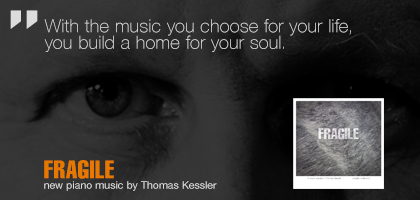No. 261 February 2026
- COVER REVIEW: TECHDAS Air Force IV ⸜ turntable » JAPAN
- RECORDING TECHNIQUE ⸜ music: 3M DIGITAL AUDIO MASTERING SYSTEM Part 2 || MUSIC » USA
- MUSIC ⸜ review: ARNE DOMNÉRUS, , Jazz At The Pawnshop, Proprius/AudioNautes Recordings MQA-CD Crystal Disc ⸜ 1977/2025 » SWEDEN / ITALY
- REVIEW: CIRCLE LABS AS100 ⸜ integrated amplifier » POLAND
- REVIEW: SHANLING EC Zero T ⸜ MQA-CD player • mobile » CHINA
- REVIEW: FEZZ AUDIO Sagita Prestige Evo & Olympia Evo Mono ⸜ linestage & power amplifier • monaural » POLAND
- MICRO REVIEW: ACOUSTIC REVIVE PS-DBLP ⸜ record clamp / stabilizer » JAPAN
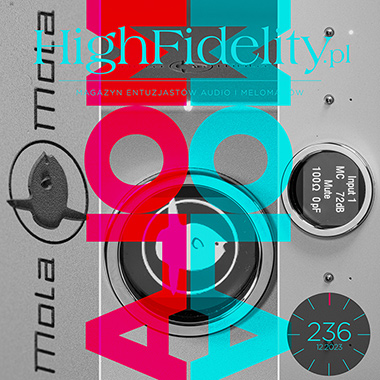
|
Editorial
Text by WOJCIECH PACUŁA |
 |
No 236 January 1, 2024 |

⸜ Sony Music in Japan still releases SACDs in 7-inch mini LP format And this should not happen. After all, the so-called "second album syndrome" is known, well known. It is close to us especially in music, because it is paralyzing for many bands and performers, which is also true for writers. The more so, the better their debut was. If you look at them, you will understand that to bear this pressure is very difficult, for many - unfeasible. And here comes a surprise: Little Life was Yanagihara's second novel (the first was the 2013 book People in the Trees). However, when I heard that the writer was finishing writing a new thing I was concerned. Because how can something so excellent be topped? Published last year, and available in Polish this year, the novel To Paradise, initially disappointed me. Completely different and spread out over an even longer period of time, it only drew me in so much after about 1/3rd that I couldn't wait until the evening - that's when I have time to read - to return to it. And yet it is an incredibly sad, depressing story. But also a story in which the writer "hid" basic truths about life - universal but yet very personal, for each of us. Because it is a book about freedom. Freedom understood as a fundamental value, without which life is incomplete, and perhaps even meaningless. And now - how do I move from freedom to Compact Disc? - Here you go: the writer alludes to the belief that taking away freedom always ends with control over what we listen to and watch. Controlling the message is for the state - any state, we might add - a key element in its quest for domination. Remember Orwell and 1984? Yanagihara sees things similarly:
This is even easier in the second decade of the 21st century. Modernity seeks asymptotically to pour everything into the virtual world and eliminate, as much as possible, its material counterparts. That is - not modernity, but corporations. For when we say "state" we are most often describing the influence of these transnational, democratically unregulated power centers. It pays off for them to control us, it is them who dream about an ideal consumer. And the ideal consumer is one who is completely dependent on them, and yet still believes he has free will. That's why I'm watching with such interest the paradigm shift that shapes people's interest in recorded music. After the absolute craze for audio files, after the return to vinyl records in mass culture, something is also happening in the sphere related to silver and gold discs. 
⸜ Japanese publisher Wowow Entertainment is dragging its feet in deciding which CD formula to stick with. First it released Larks' Tongues In Aspic on a 7-inch Platinum SHM-CD, for the 50th anniversary it released the box In The Court Of The Crimson King (50th Anniversary Edition) with three K2HD UQQCDs and Blu-ray Audio, and now we get the box Larks' Tongues In Aspic (50th Anniversary Edition) with SHM-CDs and Blu-ray Audio. The files are good, to be clear. Vinyl is wonderful, I have no doubt about that. But let's also know that the pumping up of both categories by corporations is designed to make us dependent (files) and stupefied (vinyl). The addiction is that we "should" rely on cloud-based data available to us via streaming services, because then we get exactly what their owners want, and the stupefaction is that few modern LP releases make sense. An example? - Here you go: FLAC MQA files. The format, while controversial, has gained enough popularity to become a staple of hi-res file distribution through the Tidal service, and in Japan it has sparked a long series of CDs encoded this way, and released by the Japanese division of Universal Music. When MQA Ltd. went into receivership in early April, a landslide began. Uncertain about its future, investors began withdrawing their money, and Tidal reacted as well. It reacted by starting to swap MQA files for high-resolution FLAC by changing the software of its devices so that the latter would be displayed first wherever possible. So - we had access to some information, and now we don't. We get its "replacement", which is good, but you can see, after all, that in this way we can lose, overnight, all "our" resources, likes, and playlists. All it would take is for the operator in question to go bankrupt, or change its policies. We should add that the fact that MQA has problems is also evidenced by the lack of new titles on UHQCD + MQA discs. |
And this is why I treat Compact Disc as an expression of freedom. It's an extremely convenient to use, difficult to damage medium, incredibly stable over time, in which it's far superior to vinyl. It's ours and ours alone, unlike files and streaming (reminder: even when we buy files, it's only a "rental" and by selling the disc we are obliged to clear it; by law you can't resell files). And on top of that, it's getting better and better sounding. Both the efforts of manufacturers of playback devices and publishers are going in the direction of better and better sound. Even if the financial aspect of such efforts, as in the case of Super Audio CD, is in question; although it's a separate format, I treat it as an extension of CD. After all, there is no economic justification in the fact that Polskie Nagrania, or rather its owner, Warner Music Poland, is releasing as many as seventy-five titles on discs of this type, right? - Seemingly so, but... There isn't, unless we understand it differently: here is a large publisher propping up the authority of audiophiles in order to re-sell the same titles it offered some time earlier on CD and then on vinyl. That's "leverage" - and it's already completely sensible and business-wise. 
⸜ SACD is a beautiful medium for classical music - it offers both stereo and surround versions; pictured is the latest Ensemble Peregrin disc by Tacet For us, meaning audiophiles - it’s a dream come true. We get great remasters by Damian Lipinski of really important titles for Polish music (in a while there will be a ten-disc box with discs by the Perfect, remastered by Pawel "Bemol" Ladniak, also on SACD (!); more about Pawel → HERE «PL»). And if people who listen to music in a smaller regime than we do also pick up something from this - even better. Anyway, in Japan, too, CDs continue to be released in seemingly niche formats and formulas, and major labels are doing it. And the more channels of communication, the - see the quote above - more freedom. That's why I passionately buy new Sony Music releases on CD Japan, which are coming out in the wonderful form of 7-inch mini LPs and on SACDs, and why I look out for new versions of old albums on UHQCDs, BSCD2, SHM-CDs and SHM-SACDs (more: → www.CDJAPAN.co.jp). Because diversity means freedom. From a technocrat's point of view, it is a waste of resources and money. But it is the technocratic, exclusionary way of thinking that can easily become a tool of oppression. And with this comes something that we sometimes forget, namely, that art is, in principle, non-purposeful. That is, it does not "serve" anything and is not "in the service" of anything. It does not "need" anything and cannot be "forced" to do anything. If it changes reality, it does so precisely because it is art and not a tool. Art that is "entangled" is art only in part, and perhaps even art ceases to be art at all and begins a new life as a vehicle for ideas intended to influence someone so as to gain power over him. True art does not enslave anyone. 
⸜ SACDs are also released by small labels such as SVP Recordings, belonging to a musician, Michael Berg It is therefore useful to look at music from this point of view. If someone has power over us both in terms of music selection - although many choices seem like our own, they are the choices of a staff of AI-assisted people - and access to it, it means they have power over us. That's why CD and SACD seem so important to me. Charlie, one of the protagonists in the second novel, living in a dystopian dictatorship in which only targeted actions were permissible, talks about the past:
Therefore, it is worthwhile, in my opinion, to celebrate this diversity. And in it, CD and SACD, convenient, owned by us, offering great sound, can play an important role. So, along with the entire editorial staff of HIGH FIDELITY, I wish you as much music in these formats as possible. But also music in general. Found under the Christmas tree and on a daily basis. Because, after all, choice is what it's all about. Thank you, our readers, for all of 2023. For being with us and for your support and the good words you sent to us. Next year we are celebrating the magazine's 20th anniversary, and this was made possible, on the one hand, thanks to the manufacturers, distributors and stores that, with their money, ensured our operation, and on the other, thanks to you. Together, we believe, we are making the audiophile world a better place. All the best for the whole next year! 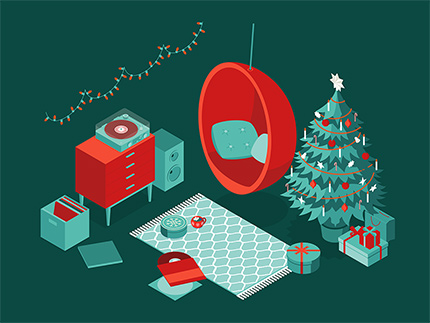
WOJCIECH PACUŁA The text included an affiliate link to CD Japan's online store. ● |
About Us |
We cooperate |
Patrons |
|
Our reviewers regularly contribute to “Enjoy the Music.com”, “Positive-Feedback.com”, “HiFiStatement.net” and “Hi-Fi Choice & Home Cinema. Edycja Polska” . "High Fidelity" is a monthly magazine dedicated to high quality sound. It has been published since May 1st, 2004. Up until October 2008, the magazine was called "High Fidelity OnLine", but since November 2008 it has been registered under the new title. "High Fidelity" is an online magazine, i.e. it is only published on the web. For the last few years it has been published both in Polish and in English. Thanks to our English section, the magazine has now a worldwide reach - statistics show that we have readers from almost every country in the world. Once a year, we prepare a printed edition of one of reviews published online. This unique, limited collector's edition is given to the visitors of the Audio Show in Warsaw, Poland, held in November of each year. For years, "High Fidelity" has been cooperating with other audio magazines, including “Enjoy the Music.com” and “Positive-Feedback.com” in the U.S. and “HiFiStatement.net” in Germany. Our reviews have also been published by “6moons.com”. You can contact any of our contributors by clicking his email address on our CONTACT page. |
 



|
   |
main page | archive | contact | kts
© 2009 HighFidelity, design by PikselStudio,
projektowanie stron www: Indecity
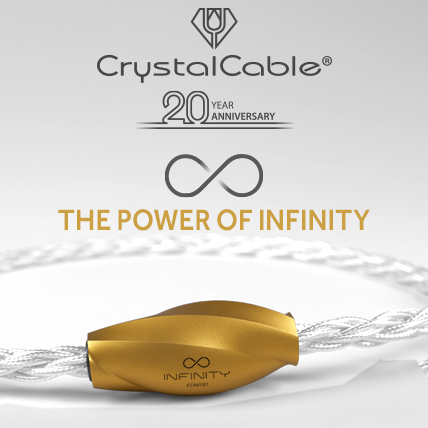


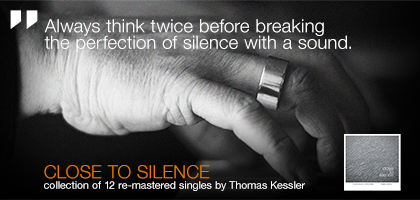

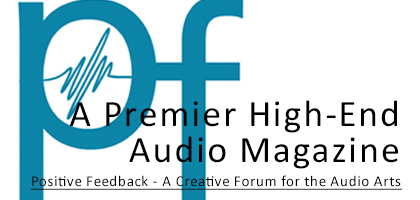

 NOVEL THAT DEEPLY MOVED ME and, I believe, changed me was A Little Life from 2015 by American writer Hanya Yanagihara. I will not reveal to you what it is about, because it is not the plot here that is most important, but the way the characters are portrayed. We rejoice when they rejoice, we grieve when they grieve and - this is most often - we suffer when they suffer. When the novel ends we are different people. Or at least, I think I was.
NOVEL THAT DEEPLY MOVED ME and, I believe, changed me was A Little Life from 2015 by American writer Hanya Yanagihara. I will not reveal to you what it is about, because it is not the plot here that is most important, but the way the characters are portrayed. We rejoice when they rejoice, we grieve when they grieve and - this is most often - we suffer when they suffer. When the novel ends we are different people. Or at least, I think I was. Data, investigation, analysis, news, rumor - dystopia melts all these concepts into one. There is what the state says, and there is everything else, and this everything else falls under the category: information. (...) That's why all dystopias are so general in their nature and its manifestations: they abolish the means of information (press, television, internet, books - although in my opinion, they should keep television, because it might be useful to them) (...).
Data, investigation, analysis, news, rumor - dystopia melts all these concepts into one. There is what the state says, and there is everything else, and this everything else falls under the category: information. (...) That's why all dystopias are so general in their nature and its manifestations: they abolish the means of information (press, television, internet, books - although in my opinion, they should keep television, because it might be useful to them) (...).
